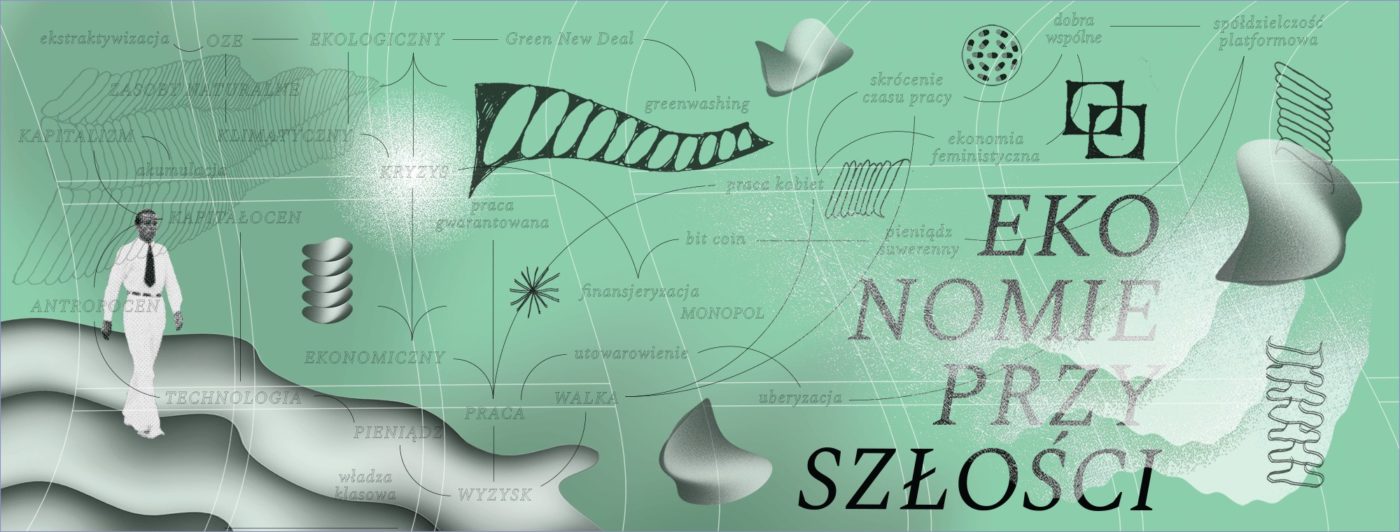Economics of the future
Curator: Przemysław Wielgosz

“Economics of the future” is an interdisciplinary project comprising seminars, debates, publications, films and radio broadcasts. It will aim at be expanding the area of the economic debate in Poland to include previously ignored or marginalised topics. This inclusion will make the debate capable of opening up to the challenges of the future. For a long time we have watched as the reality has evaded the framework of conventional economics. Phenomena such as the climate crisis, exhausting the possibility of externalising the costs of economic growth to the environment, near end of the pay race to the bottom, robotisation and the boom of new technologies challenge many of incontrovertible truths on which economic debates and policies are still based. But the longer we ignore them, the higher the price we will have to pay for their increasing impact on our lives. This is why we should decide to take on the double risk. First, we should make the effort to develop a new approach in economics. An approach that will revolutionise not only theory but, above all, practice, reclaiming its forgotten meaning – which should consist not of the capital gain, but collective fulfilment of needs. Secondly, we must go beyond the economic and expert niche. The stake is democratisation and overcoming depoliticisation which for years, under the banner of neoliberalism, has been disarming all critical thinking and taking away the voice from citizens of formally democratic societies in essential matters shaping their everyday existence.
The “Economics of the Future” project stems precisely from this diagnosis and it will attempt to realize both strategies outlined above. The series scheduled for 12 months will include a package of activities every month. Each will contain seminars, discussions, interviews and publications which we will prepare and make available online and via social media outlets invited to collaborate. Each will comprise three overlapping thematic areas.
Firstly, we will be interested in economic/social/historical issues and challenges whose importance will grow in future and which are already visible for us, but remain outside the field of vision of neoclassical economics. So we will look into the political economics of the climate catastrophe, global reproletarianisation, migration, new extractivism, Anthropo- and Capitalocene, global value chains, new imperialism, privatisation od cultural and natural heritage.
Secondly, the issue of interest are stakes related to ongoing economic social struggles whose outcome will determine the shape of our future. We will examine strategies, struggles and particular ideas which are supposed to face up to the phenomena outlined above. Among them – fighting for leisure time, payment schemes for writing dissertations, examples of radical technologies, postulates of quitting the externalisation of environmental costs (negative GDP points for emission and using up resources), food sovereignty, sharing and decommodification strategies.
Thirdly, we will study theoretical propositions which postulate social transformation and are oriented on supporting it. Concepts in economics which are political and thus restore this field of knowledge to its rightful place among social sciences. For instance, Modern Money Theory, feminist economics, ecological economics, general intellect theory, Marxist economics, or common good economics.
Our objective will be not only pointing out topics and concepts which economics should consider but, above all, reclaiming economic imagination, intellectual courage and the political potential of change necessary to redesign economic relationships, so that they become a field of social agency, negotiation and democratic innovation.
Curator:
Economics of the pandemic
(April 2020)
The pandemic crisis dramatically validated ideas behind the “Economics of the future.” Only recently the idea of going beyond the framework of the dominant neoliberal doctrine and economic policies based on that doctrine seemed an issue worthy of the introduction into the public debate. Today it became necessary to practically question the majority of sacred principles and fundamental laws of mainstream economics. In the face of the pandemic, upholding the policies of budget cuts, privatisation of public services, employment precarisation, privileged position of short-term profitability and faith in the invisible hand of the market all threaten not only the economy, but also the survival of the democratic society and saving people’s lives. On the other hand, such issues as systemic intervention of the state, money creation, socialisation and democratisation of economic management, the New Green Deal, pubic and common goods came to the forefront. In this very moment we need a new economic consensus which will replace stale and rotten principles of the neoliberal Washington Consensus. So, we cannot repeat the mistakes that were made during the 2007-2015 crisis. Pumping billions into financial institutions that caused the global collapse and stifling the economic development with policies of cuts is not the right way. We must think, postulate and design a completely different economic practice. A crisis is a time when we should apply our imagination and courage – features whose deficit cast a shadow over economic policies of the past three decades.
This is why despite obstacles posed by self-isolation and social distancing we decided to continue with the Economics of the future seminar, expanding its formula to include extra online activities.
Firstly, we propose a series of short commentaries from economists participating in our seminar that will concern the current situation and the pandemic crisis, prognoses of its economic repercussions and ways of dealing with them, as well as strategic conclusions which we should draw from this experience.
Secondly, we invited economists participating in Economics of the future to write pieces commenting the current crisis from the viewpoint of their specialties and theoretical currents.
Thirdly, we will invite our guests to prepare and record short lectures. We will publish them online, according to the original schedule of seminar meetings. We will also invite all registered participants of the seminar to join the discussion with the authors of these presentations.
Commentaries on the pandemic crisis (in Polish):
Texts:
People:
Topics
Economics and politics of radical technologies (28 January 2020)
– New economy i.e. the tyranny of technology – Maria Świetlik (Roz:Ruch)
– Uberisation, capitalism, or cooperation in the era of digital platforms – Jan Zygmuntowski (Instrat, Kozminski University)
Moderator: Przemysław Wielgosz (LMD-PL)
How to fight exploitation effectively in the 21st century? (3 Marz 2020)
– No more full-time jobs? – Zuzanna Kowalik (Warsaw School of Economics, Instrat)
– Class struggle in the 21st century. Strategy of social change in the era of mass proletarianisation, gig economy and global supply chains – Agnieszka Mróz (Workers’ Initiative)
Moderator: Przemysław Wielgosz (LMD-PL)
Finances after financialisation (21 April 2020, online)
– Will there be finances after financialisation? – Prof. Jan Toporowski (London University/SOAS)
Moderator: Przemysław Wielgosz (LMD-PL)
When wealth becomes a problem: the price of inequality (19 May 2020, online)
– Paweł Bukowski (London School of Economics)
Moderator: Przemysław Wielgosz (LMD-PL)
Postkeynesism the day after tomorrow (2 June 2020, online)
– Hanna Szymborska (Birmingham City University)
Moderator: Przemysław Wielgosz (LMD-PL)
Money of the future (16 June 2020, online)
– Modern Money Theory and employment guarantee – Dr Paweł Umiński (Faculty of Management and Economics Gdańsk University of Technology, Edward Lipiński Foundation)
Moderator: Przemysław Wielgosz (LMD-PL)

